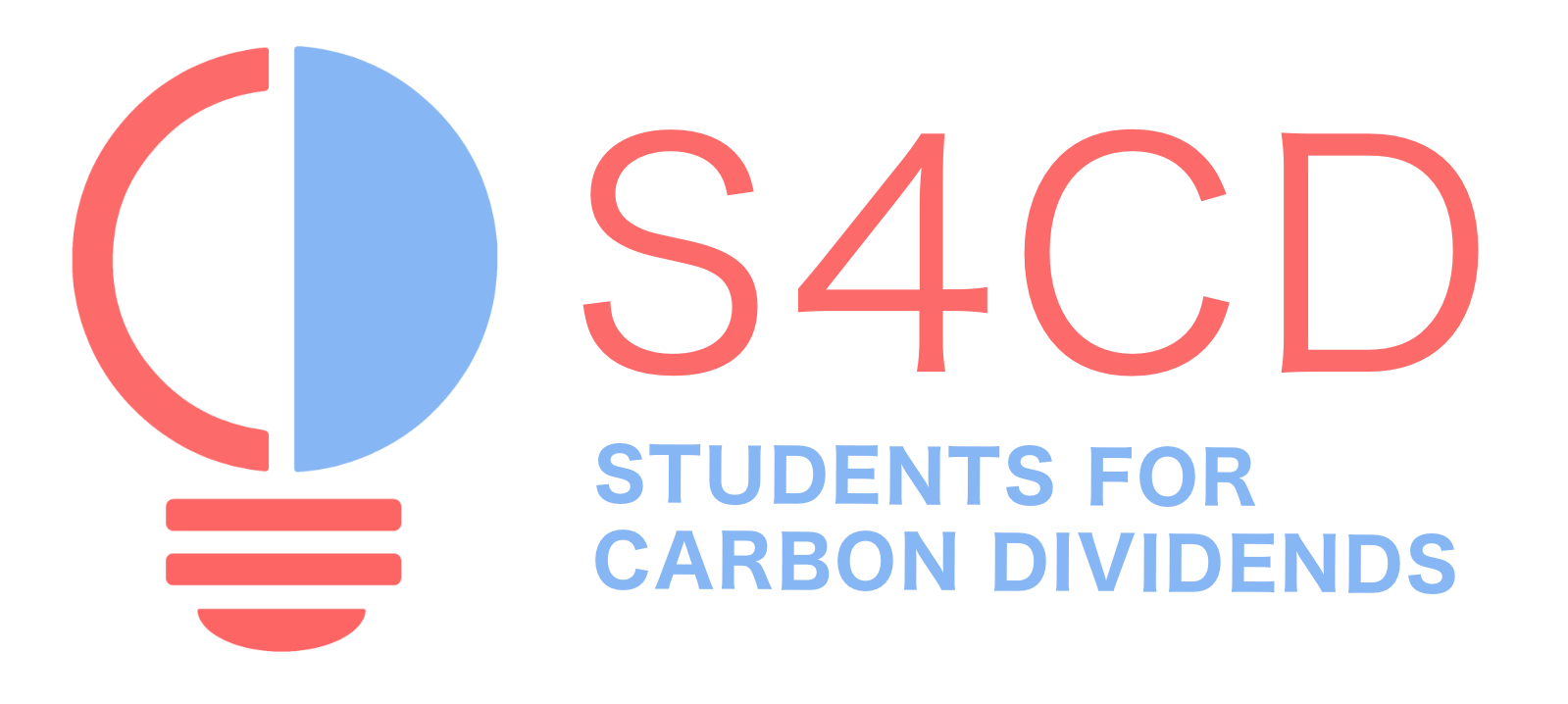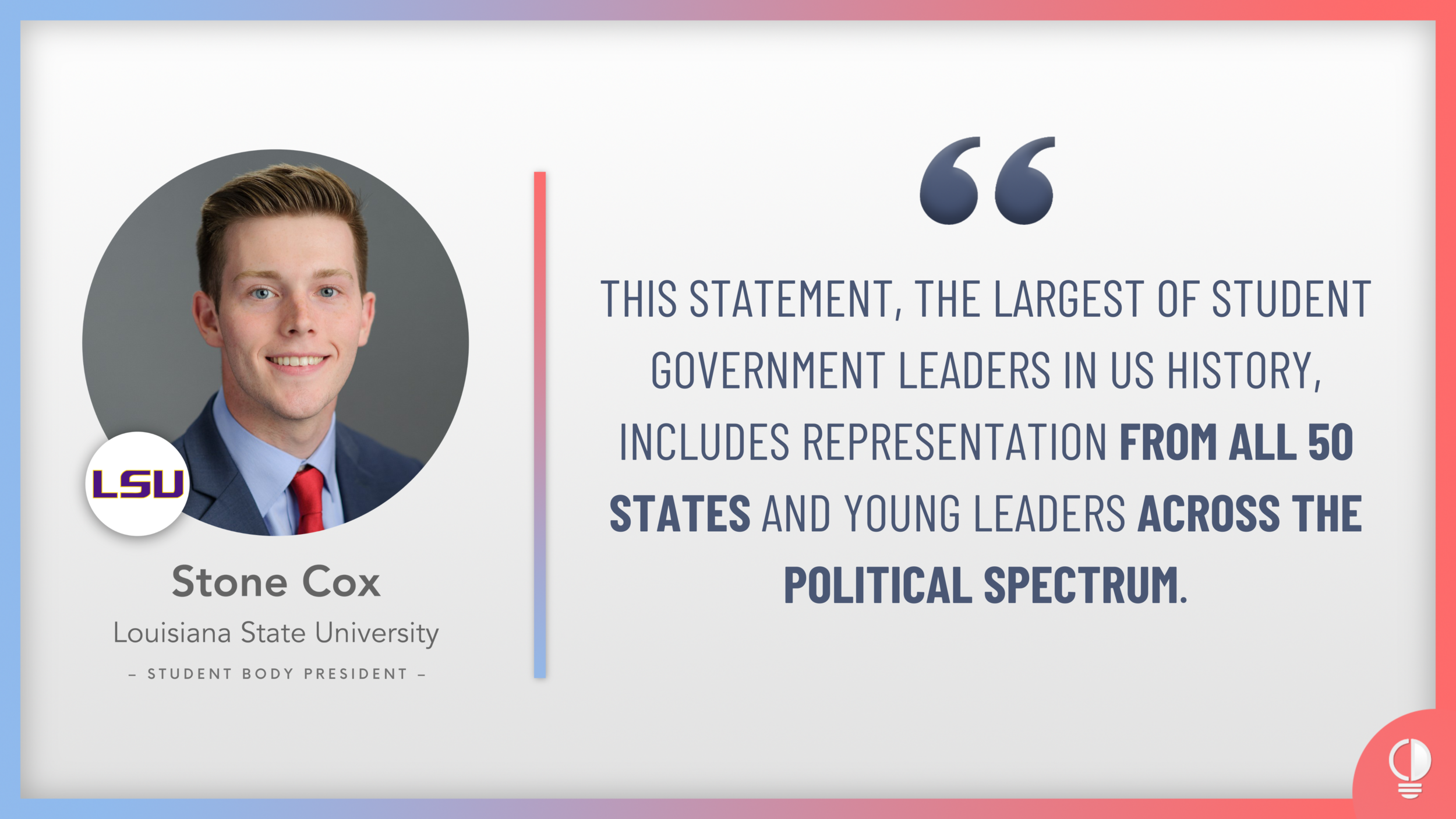The Largest Statement of Student Government Leaders in US History!
STUDENT GOVERNMENT LEADERS IN ALL 50 STATES UNITE AROUND BIPARTISAN CARBON DIVIDENDS CLIMATE PLAN
Leaders of a Generation. A Plan to Protect the Generations.
This week, more than 350 student government presidents—representing all 50 states and more than 4 million students—issued a national statement in support of the bipartisan climate solution known as carbon dividends.
The statement, which unites Republicans and Democrats alike, is the largest public declaration of student government presidents in US history.
The signers come from US colleges and universities as diverse as Liberty University, Brigham Young University, Harvard, Stanford, Kansas State, Mississippi State, Spelman and Morehouse. Despite the differences in their political views and backgrounds, they all agree: climate action is essential and the carbon dividends solution provides a clear path forward.
“Our generation is tired of partisan theater and eager to see our political leaders unite around concrete and effective climate measures,” said Alex Posner, the founding president of Students for Carbon Dividends (S4CD), which helped to organize the statement. “Where our elected leaders have been unable or unwilling to come together to find solutions, we on college campuses are showing them how it’s done.”
This student leader climate statement builds on last year’s Economists’ Statement on Carbon Dividends—the largest public declaration in the history of the profession. Those signees, overwhelmingly economics professors on college campuses, did their part in shining a spotlight on this solution. Now student leaders are carrying the torch forward.
“Last year, I was honored to help organize the Economists’ Statement on Carbon Dividends, which became the largest public declaration in the history of the economics profession,” said Janet Yellen, former Federal Reserve Chair, in a prepared statement. “Economists pointed the way, and now student leaders are championing the cause. It is advocacy efforts like this that will make concrete climate solutions possible.”
The carbon dividends strategy has earned major support from American economists, environmental NGOs, and business leaders alike. This includes the endorsement of 27 Nobel laureate economists and 15 former Chairs of the Council of Economic Advisers—representing every presidential administration on both sides of the aisle in the last half-century.
The market-based carbon dividends solution features four pillars: 1) a gradually rising and revenue-neutral carbon fee; 2) carbon dividend payments to all Americans, funded by 100% of the revenue; 3) the phase-out of carbon regulations that are no longer necessary; and 4) border carbon adjustments to level the playing field and promote competitiveness.
“Economists are a contentious lot, but this is one area where this is sweeping agreement,” said N. Gregory Mankiw, former Chairman of the Council of Economic Advisers to President George W. Bush. “Policies like carbon taxes and dividends yield as much consensus among economists as the reality of climate change does among scientists. I am excited to see students leading the way forward on this cornerstone solution.”
“Regardless of how the election shakes out in the fall, we need climate solutions that can pass and last,” said Nico Ferretti, student body president at Georgetown University. “Policies that are introduced in one administration and quickly repealed in the next are not a viable way to address climate change.”
“Proposals that seek to dismantle capitalism or advance a partisan agenda can breed mistrust and hinder progress on this issue,” said Stone Cox, student body president at Louisiana State University. “Instead, a market-based climate strategy like carbon dividends offers the most promising basis for a bipartisan climate breakthrough.”
“Agreeing on everything should not be a precondition for agreeing on something. That’s what we’re modeling here, and with a ‘something’ that is very significant,” said Asim Ahmed, student body president at the University of Georgia. “A well-designed carbon dividends policy would deliver huge emissions reductions, and fast. It is the single most important tool we have to address climate change.”
“With this national statement of student body presidents, we are offering a mandate and a plan,” said Riley von Borstel, student body president at the University of Alaska Fairbanks. “To those elected officials willing to lead, we look forward to collaborating on the important work ahead.”
Over the coming months, S4CD will continue to partner with student leaders across the country in support of the carbon dividends solution, including through virtual events, digital ad campaigns, op-eds, and other public advocacy. Through these and other efforts, S4CD will highlight that young people support the carbon dividends solution and—even during the coronavirus lockdown—are committed to leading the charge on this critical issue for our generation.










